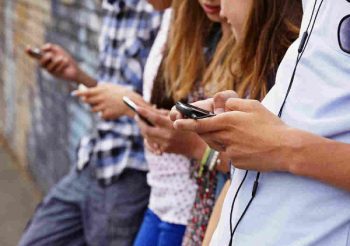 By Nikki Harper
By Nikki Harper
Staff Writer for Wake Up World
If you’ve got teenagers, you probably know how hard it can be to separate them from their smartphones. Statistically, 95% of 17-20 year olds use smartphones [1] and parents might be forgiven for thinking that a good number of those actually have their phones attached to them via some kind of technological umbilicus. Research into the connections between smartphone use and mental health is still in its infancy, but many suspect that an increasing reliance upon smartphones can be detrimental to our psychological wellbeing.
[pro_ad_display_adzone id=”110028″]
Of course, teens can often be moody and depressive; it’s part of their job. We’ve all been there. Most of us, however, navigated our teen years without the benefit, or otherwise, of smartphone technology. You might think that teens who are lonely and depressed end up reliant on their smartphones – but could it actually be the other way round? Could smartphone use be a predictor for future loneliness and depression?
New research from the University of Arizona suggest that yes, reliance on a smartphone can lead to loneliness and depression, not the other way round [1]. Researchers Matthew Lapierre, Pengfei Zhao and Benjamin Custer studied 346 adolescents between the ages of 17 and 20, in a longitudinal study over three months. They chose this age group to study precisely because teens of this age are already vulnerable to depressive factors, due to their hormonal changes and the stage of life transition they are in.
During the research, the teens were asked to score themselves on a four-point scale for questions related to smartphone dependency – for example, the statement “I panic when I cannot use my smartphone” [2]. They also answered other questions designed to reveal the amount of their smartphone use, how lonely they felt and where they scored for several depressive factors. Participants answered the questions once at the start of the study and again at the end.
The results were quite startling. The research team found three key indicators [1]:
- Smartphone dependency at the beginning of the trial predicted loneliness and depression at the end
- Loneliness at the beginning of the trial predicted depression at the end
- Smartphone use at the beginning of the trial predicted smartphone dependency at the end
Note that the trial distinguishes between smartphone use – casual, non-dependent use, which can be beneficial – and smartphone dependency, where the user has a psychological reliance on the device.
These findings are significant because they suggest that a new approach is needed to help advise teens and their families about the potential psychological risks in becoming dependent on smartphones. The research team suggest that in addition to a new strategy from healthcare providers, teens should be advised on how to find other ways to manage stress – since many turn to smartphones as a way to alleviate stress [2]. Suggestions might include exercise, meditation and socialising more. Further, the researchers would like to see teens learning how to self-impose limits on smartphone use.
Our current generation of older adolescents and young adults have grown up with smartphones – and they see the adults around them just as potentially depended upon them too. However, with rate of depression and anxiety among young adults known to be skyrocketing, perhaps it really is time for a more balanced approach towards the ubiquitous smartphone.
Article sources:
- [1] https://www.jahonline.org/article/S1054-139X(19)30337-4/fulltext
- [2] https://www.sciencedaily.com/releases/2019/09/190930161918.htm
Recommended articles by Nikki Harper:
- Harnessing the Power of Synchronicity
- Beyond 11:11 – The Significance of Repeating Number Patterns
- A Time to be Born and a Time to Die: Can Astrology Predict Death?
- Premature and Caesarean Birth: An Astrological Misinheritance?
- The Benefits of a Daily Divination Practice – and How to Start One
- 7 Ways to Find Awe in Your Everyday Life
- Need Answers? Looking for Insight? 7 Ways Astrology Can Help
- Alone But Not Lonely: 6 Amazing Benefits of Solitude
- Dancing in the Rain: 6 Reasons We Should All Be Pluviophiles
- Finding Time for a Daily Spiritual Practice – How and Why to Devote Your Time
- 7 Simple Steps to Start Communicating With Nature
- Getting Started with Remote Viewing: Step by Step to Strengthen Your Psi Abilities
About the author:
 Nikki Harper is a spiritualist writer, astrologer, and editor for Wake Up World. She writes about divination, astrology, mediumship and spirituality at Questionology: Astrology and Divination For the Modern World where you can also find out more about her work as a freelance astrologer and her mind-body-spirit writing and editing services. Nikki also runs a spiritualist centre in North Lincs, UK, hosting weekly mediumship demonstrations and a wide range of spiritual development courses and workshops.
Nikki Harper is a spiritualist writer, astrologer, and editor for Wake Up World. She writes about divination, astrology, mediumship and spirituality at Questionology: Astrology and Divination For the Modern World where you can also find out more about her work as a freelance astrologer and her mind-body-spirit writing and editing services. Nikki also runs a spiritualist centre in North Lincs, UK, hosting weekly mediumship demonstrations and a wide range of spiritual development courses and workshops.
Say hi at Questionology.co.uk or on Facebook.
[pro_ad_display_adzone id=”110027]






